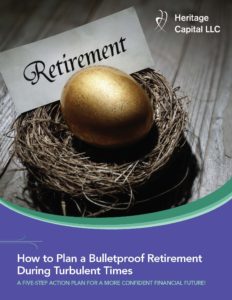6 Smart Strategies for High Net Worth Retirement Planning
High net worth (HNW) families such as yours face unique challenges, and opportunities, in the years leading up to retirement. You require sophisticated planning that addresses the complexities that inevitably accompany affluence, from tax strategies to estate plans. It’s critical to partner with the right professional financial advisor, someone with the knowledge and experience to customize solutions for your unique circumstances. And a friendly, caring attitude wouldn’t hurt, either.
Here are six elements of an overall strategy that map out the actions you can take now to help ensure the retirement you want.
1. Set Goals
Goals fundamentally drive retirement planning. As important as it is to set them early, goals are also dynamic, which is why you must update them frequently, especially as retirement approaches.
For most folks, the primary goal is to set a retirement date. Knowing the age you and your spouse will retire wonderfully concentrates the mind. That magic age delineates the transition from wealth accumulation to wealth decumulation. It’s when your focus shifts to your retirement activities, everything from sailing the oceans to directing philanthropic initiatives, while bearing in mind your commitments to your loved ones.
2. Invest Early And Consistently
Goals require funding, which is why it’s so important to channel your income into your retirement savings. Tax-deferred and tax-free retirement plans such as IRAs, 401Ks and ESOPs are necessary but insufficient due to their restricted contribution limits. Many HNW individuals supplement their retirement accounts using trusts, family offices, and foundations, each with unique investment requirements.
You will need to diversify your investments to withstand market volatility. Investors can own stocks, bonds, commodities, real estate, and other assets that blend well in all market environments. Your investment strategy should provide income streams protected against inflation (e.g., annuities, real estate, Social Security benefits). It’s critical to rebalance your portfolio once or twice a year to maintain the diversification that matches your tolerance and capacity for risk as they evolve.
3. Estimate Your Annual Cash Flow Requirements
Budgeting is the key to developing a meaningful estimate of your future cash flow requirements. Prudence dictates that you plan for up to 30 years in retirement. To that end, your budget should encompass the full range of spending, including lifestyle choices, insurance, taxes, and charitable giving. In effect, this is the stage where you quantify your goals.
As with your goals, your projected budget will need periodic updating. Naturally, its accuracy will increase as retirement comes closer and facts replace assumptions.

4. Manage Income Streams
Your retirement plan incorporates your calculations for income streams from the assets in your portfolio. It should comprehend how your cash flows and investments will change when you retire (i.e., the decumulation phase), including landmark events such as selling your business (or your share of a partnership), collecting a retirement package from work, and acquiring and disposing of property.
You also need to plan the sequence of cash flows for maximum tax efficiency during the decumulation phase. For example, you can delay your Social Security benefits (SSB), avoiding the added taxes they incur. Otherwise, your marginal tax rate might increase due to higher SSB taxes triggered by additional non-SSB income. It makes sense to postpone filing your claim until age 70 and delaying the SSB “tax torpedo.”
A strategy to maximize after-tax retirement income should address a set of functional objectives to:
- Manage a portfolio at the household level rather than separately for each individual.
- Maximize the benefits of fully taxable, tax-deferred, and tax-exempt accounts. For example, taxable accounts are often the best place for investments relatively immune to taxes, whereas tax-advantaged accounts should hold tax-sensitive investments. This objective is to achieve tax efficiency by optimizing asset location and withdrawal sequence.
- Optimize tactics and timing of cash inflows, such as maximizing the value of Roth conversions, delaying Social Security benefits, tapping income from an annuity, and diminishing the tax effects of required minimum distributions.
- Maximize tax deferral and minimize tax drag by harvesting losses to offset gains, diversifying investments, limiting exposure to taxable distributions (interest, dividends, capital gains), and rebalancing investments to reduce tax liability.
As an HNW individual, you face particular challenges that impact your income strategies, such as the Medicare Income Related Monthly Adjustment Amounts and the Net Investment Income Tax. Accelerating income taxed at a higher bracket may significantly reduce future income taxes and additional Medicare premiums.
“We specialize in helping those preparing for or already in retirement.” – Paul Schatz, Heritage Capital
5. Build a Contingency Fund
You should deploy part of your assets as cash and highly liquid equivalents that you can use in an emergency without having to sell investments. You may never need to tap this low-risk, low-return portion of your portfolio, but the peace of mind can be immense.
While insurance is a vital part of your retirement assets, it may be inadequate for certain contingencies, leaving you vulnerable to unanticipated asset sales unless you’ve put aside sufficient emergency funds. It may be preferable for tax efficiency to hold contingency funds in tax-free accounts.
6. Create an Estate Plan
HNW families require an estate plan because it lets you designate who will handle your financial responsibilities after you die or become incapacitated. The plan lays out who will inherit your assets while allowing you to minimize income, gift, inheritance, and estate taxes.
The two essential items in an estate plan are your will and a set of one or more trusts. Your financial advisor can help set up your trusts to meet your legacy goals for your family and charitable giving. Your estate plan assures that your wishes will be met with a lower tax impact.
The bigger the estate, the more planning you’ll need. However, any estate plan can be sophisticated and require the knowledge of an expert on taxes, trusts, and estate law. Your financial advisor can help you create a road map that will give you and your loved ones clear instructions on how to distribute your wealth after your death.

Looking for a registered investment advisor in Connecticut?
If you’re thinking about changing investment advisors, you can easily get a second opinion in New Haven from Heritage Capital. At Heritage Capital you can “Invest for Tomorrow. Live for Today. ™” We offer a no-obligation six-month free test drive. Schedule a conversation today!


